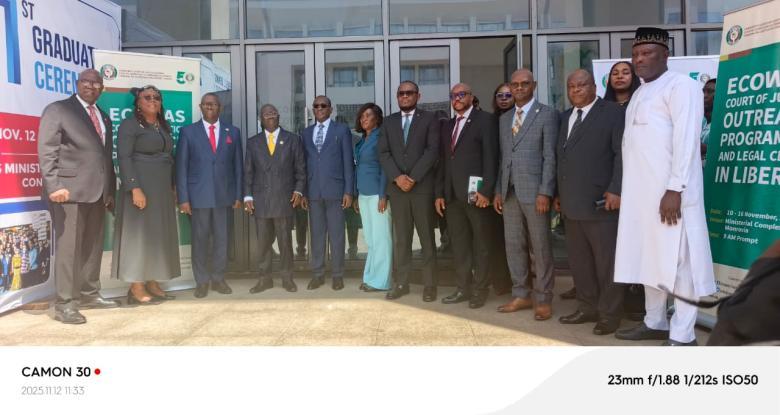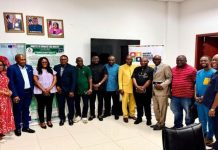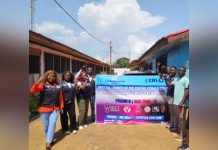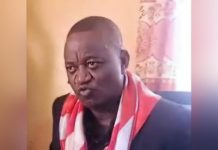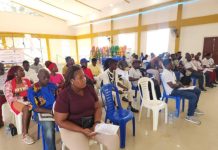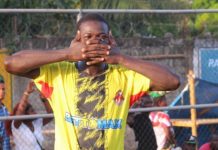Africa-Press – Liberia. The outreach is intended to bridge the knowledge gap between the Court and citizens of the sub-region.
As part of many activities in commemorating its 50th year of existence, the ECOWAS Community Court of Justice has commenced a four-day outreach and legal clinic in Monrovia, aimed at deepening public awareness of the Court’s mandate, jurisdiction, and procedures while strengthening the bond between the Court and citizens of the Economic Community of West African States (ECOWAS).
The outreach is intended to bridge the knowledge gap between the Court and citizens of the sub-region, many of whom remain unaware of their right to access the regional judicial body, especially in matters of human rights violations.
The opening ceremony, held at the Ministerial Complex in Congo Town, brought together senior government officials, members of the judiciary, the diplomatic corps, civil society representatives, legal practitioners, and ECOWAS officials.
Liberia Commended Amid Call For Stronger Collaboration
Speaking at the occasion, the President of the ECOWAS Community Court of Justice, Justice Ricardo Cláudio Monteiro Gonçalves, lauded Liberia for fully ratifying all key protocols establishing and expanding the Court’s mandate, including the 1991 Protocol, the 2005 Supplementary Protocol, and the 2006 Protocol.
“Liberia deserves recognition and commendation for its leadership,” Justice Gonçalves stated. “Your country’s ratification of all the protocols governing this Court demonstrates a firm commitment to the rule of law, regional justice, and cooperation.”
Justice Gonçalves called for stronger collaboration between national institutions and the ECOWAS Court to ensure that justice is accessible to all citizens in the region. He noted that such cooperation is vital for the promotion of peace, stability, and sustainable development across West Africa.
The event was graced by several dignitaries, including Chief Justice His Honor Yamie Quiqui Gbeisay, Associate Justices of the Supreme Court of Liberia, the leadership of the ECOWAS Community Court of Justice, Deputy Foreign Minister Dr. Ibrahim Nyei, and other senior government officials.
Chief Registrar Underscores Court’s Human Rights Role
Chief Registrar Yaonzs Ouro-Sama described the outreach as a reflection of ECOWAS’s transformation from an “ECOWAS of States” to an “ECOWAS of Peoples,” stressing that the Court belongs to the citizens of the region.
“Although the Court has existed since 2001, many community citizens are unaware of its existence or mandate. This outreach and legal clinic are therefore designed to create awareness and educate citizens on how to access the Court,” he stated.
Chief Registrar Ouro-Sama explained that under the Supplementary Protocol of 2005, the ECOWAS Court’s jurisdiction expanded beyond disputes among member states to include human rights cases, making it one of the few regional courts in Africa where individuals can directly file human rights complaints.
“The human rights jurisdiction of the ECOWAS Court has become the centerpiece of its judicial activities, as most cases lodged before it involve the violation of human rights,” she added, noting that the Court is not an appellate body over national courts but rather a court of first and last instance whose judgments are final and binding.
He also expressed gratitude to President Joseph Nyuma Boakai and the people of Liberia for hosting the event, and urged continued support for the Court’s work, which she said has received global recognition for promoting justice and the rule of law in West Africa.
Chief Justice Hails ECOWAS
Taking the podium, Chief Justice Yamie Quiqui Gbeisay, Sr., hailed the Economic Community of West African States (ECOWAS) Community Court of Justice for bringing its sensitization mission to Liberia, describing the initiative as a vital step toward deepening regional integration and access to justice across West Africa.
Chief Justice Gbeisay said Liberia was honored to be among three ECOWAS member states selected for the mission, which coincides with the regional bloc’s 50th anniversary celebration.
“We are honored that the ECOWAS Community Court of Justice has chosen Liberia for this outreach,” Justice Gbeisay said. “This visit demonstrates solidarity, shared responsibility, and a commitment to enhance cooperation across our sub-region.”
The Chief Justice emphasized that the sensitization initiative aims to bring the ECOWAS Court closer to the people by educating citizens on its role, accessibility, and the rights it guarantees. He described the Court as “a beacon of hope” for ordinary citizens seeking justice beyond their national borders.
“When governments are unwilling or unable to grant relief, citizens can trust our Community Court as a true and just arbiter,” he noted.
Justice Gbeisay reaffirmed Liberia’s appreciation for ECOWAS’ continued support in peacebuilding, democratic governance, and regional stability.
He then urged citizens, civil society, and public institutions to actively engage the visiting delegation through workshops and town halls.
Liberia Reaffirms Commitment to Regional Integration
On behalf of the Liberian government, Deputy Minister for International Cooperation and Economic Integration at the Ministry of Foreign Affairs, reaffirmed Liberia’s commitment to justice, rule of law, and regional cooperation.
Deputy Min. Nyei, who was a proxy for Minister Sara Beysolow Nyanti, lauded the ECOWAS Court for its efforts in “expanding access and navigating contemporary challenges,” describing the initiative as timely and relevant.
“It is my distinct honour and immense pleasure to welcome you all to this significant event. Your presence is a testament to your unwavering commitment to justice, the rule of law, and the advancement of regional integration in West Africa,” Minister Nyei asserted.
“Our engagement this week will lead to fruitful outcomes that reinforce judicial dialogue and the efficient administration of justice,” she said, assuring the Court of Liberia’s full cooperation in implementing its programs and decisions.
Finance Ministry Highlights Liberia’s Compliance With ECOWAS Obligations
Delivering remarks on behalf of the Minister of Finance and Development Planning, Deputy Minister for Administration, Bll McGill Jones, emphasized Liberia’s unwavering and renewed commitment to its ECOWAS financial obligations, including the payment of community levies.
“Since the ascendancy of His Excellency Joseph Nyuma Boakai as President, the issue of community payment has become a thing of the past. Except for arrears owed over many years, which the government has prioritized through the 2025/2026 budget, Liberia is now in full compliance with the 2024 and 2025 community levy payments,” Minister Jones stated.
He indicated that the ECOWAS Court plays a vital role in promoting justice, protecting human rights, and advancing regional integration, and that outreach programs like this bring the Court closer to the people it serves.
“This initiative reflects our enduring commitment to ensuring that justice, human rights, and the rule of law remain central to regional integration and the shared progress of all community citizens,” he added.
ECOWAS Commission Emphasizes Need for Awareness and Enforcement
Also on behalf of ECOWAS Resident Representative Josephine Nkrumah, Dr. Nat B. Walker, Political Advisor at the ECOWAS Office in Liberia, said the outreach forms part of efforts to commemorate ECOWAS’s 50th anniversary under the theme of deepening integration and access to justice.
He noted that while the ECOWAS Court has made significant contributions to justice and human rights, many citizens remain unaware of its functions or how to access it.
“As we celebrate 50 years of ECOWAS, this outreach provides a timely opportunity for the Court to bridge this knowledge gap, educate citizens, and promote enforcement of its judgments,” Dr. Walker said.
He outlined the key objectives of the outreach—to educate, guide, empower, and engage citizens and stakeholders on the Court’s role and accessibility.
“This program is a testament to our Court’s unwavering commitment to justice, transparency, and accessibility. It embodies ECOWAS’s belief that an informed citizenry is an empowered citizenry,” he concluded.
The Community Court of Justice, ECOWAS was created pursuant to Article 6 and 15 of the Revised Treaty. The Protocol relating to the Court was adopted in 1991, but the pioneer Judges were appointed in 2001. Basically, the Court has four distinct mandates: as a Community Court with the primary responsibility of interpreting and applying the ECOWAS Revised Treaty and other Community Texts; as an Administrative Tribunal for ECOWAS public officials; as an Arbitration Tribunal; and as a Human Rights Court.
At the same time, the visiting delegation also held a Technical Workshop for Lawyers and law students at the state-run University of Liberia.
Speaking at that occasion, Cllr. Bornor M. Varmah, President of the Liberia National Bar Association (LNBA), emphasized the critical importance of enforcing the judgments and decisions made by the ECOWAS Court of Justice in all member countries including Liberia.
He noted that the political leadership in the ECOWAS sub-region has undermined the court’s effectiveness by failing to do so.
He craved the indulgence of President Boakai to take a leadership role in encouraging regional support for enforcement, because according to him, the existence of said court is meaningless if member states cannot enforce its rulings,
And as the LNBA President highlighted specific concerns from the Liberian perspective regarding past judgments, he assured the court of the Bar Association’s commitment to collaboration.
For More News And Analysis About Liberia Follow Africa-Press

